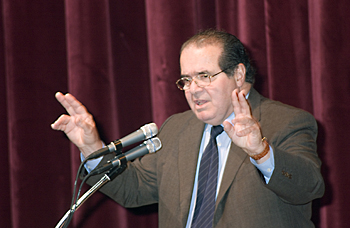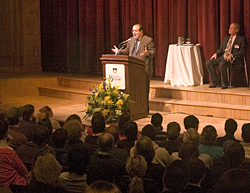
Scalia said that while supporters of originalism are a minority, those who believe that the document should address issues such as cruel and unusual punishment in accordance with “the evolving standards of decency that mark the progress of a maturing society,” do not have solid criteria for making such changes.
In a lecture punctuated with humorous comments, Scalia said opponents of originalism, which he described as “a very flexible system,” should either come up with a criterion of how the Constitution works or leave the interpretation of the law to the judges of the Supreme Court.
“Ideally, the Constitution should be the law that's figured out by lawyers,” Scalia said. “Ultimately if the people take control of what the Constitution means, you have destroyed the Bill of Rights, because the Bill of Rights is meant to protect you and me against the people. So, unless you can figure out a system that doesn't leave it to the people, but doesn't leave it to be made up by nine unelected unaccountable lawyers, you are in a terrible fix.
“The way out is the way out we've had for most of our history: The Constitution means what it says. You figure out what it was understood to mean when it was adopted and that's the end of it,” Scalia said. “If you want more rights, create them by statute, if you want more constitutional rights, create them by amending the Constitution.”
Scalia said the creation of new rights through interpretation of the Constitution is “a two-way street” that also eliminates other rights. “The right to abortion on the part of a woman is, sort of, the end of the right to live on the part of the fetus,” he said.
Scalia cited a Supreme Court ruling on flag burning, in which he cast the decisive fifth vote to uphold the protection of flag burning in the First Amendment and said originalism is a “two-edged sword” that does not always produce conservative results.
“I did not like to be on that side,” Scalia said of the ruling. “I would have preferred that there be a law that people can't burn the flag. I'm a patriotic person, but, as I understood the original meaning of the First Amendment, ... you are free to condemn the government, to criticize the government, to condemn the Supreme Court, the flag, the country. That's what it's all about: Freedom of expression.”
Describing the concept of “a living constitution” as illegitimate, Scalia said that if the standards of constitutionality are based on the thinking of current society, the U.S. should follow the English system in which parliamentary decisions determine what is constitutional.
Scalia said the U.S. has a well-functioning democracy, but he lamented the growing tendency by legislators to select judges based on popular beliefs rather than the nominees' abilities as lawyers, as is demonstrated by confirmation hearings. “It's like having a mini constitutional convention every time you assign somebody to the Supreme Court and, as you know, it's even moved down to the appeals level now. I think it's very sad.”
In response to a question by Ed Miracco, a second-year graduate student in biochemistry from Gaithesburg, Md., who asked what the young generation should do to safeguard the Constitution, Scalia said there is a great need to bring back civic education “so that the American people can appreciate what a distinctive system that we have and how well it has served our people.”
Scalia said the framers of the Constitution deliberately created the bicameral legislature and a president who is not a subject of parliament in order to create gridlock.

After the lecture, which was sponsored by UD's Legal Studies Program and the offices of the President and University Relations, Steffan Keeton, a first-year graduate student of economics from Salisbury, Md., said he did not agree with everything Scalia said, but “he is very interesting and a great public speaker.”
Rachel Kallmyer, a first-year graduate student of criminology from Baltimore, said: “I've always thought of him more as conservative, but after hearing him, I can tell it's more how he interprets the Constitution; he does not strictly observe a conservative view, he's open.”
“It was an interesting lecture,” Will Weiss, a doctoral candidate in chemical engineering from Clinton, Conn., said. “The question-and-answer section should have focused more on the students instead of the preconditioned faculty questions. Faculty have a tendency to launch agenda-based questions to which they already know what the answer will be.”
A native of Trenton, N.J., Scalia received his bachelor's degree from Georgetown University and the University of Fribourg in Switzerland, and his law degree from Harvard Law School. He was a Sheldon Fellow of Harvard University from 1960-61.
After practicing law in Cleveland from 1961-67, he served as professor of law at the University of Virginia from 1967-71 and at the University of Chicago from 1977-82. He also was a visiting professor of law at Georgetown and Stanford universities. Scalia chaired the American Bar Association's Section of Administrative Law from 1981-82 and its Conference of Section Chairmen from 1982-83.
He served the federal government as general counsel of the Office of Telecommunications Policy from 1971-72 and assistant attorney general for the Office of Legal Counsel from 1974-77. He was appointed judge of the U.S. Court of Appeals for the District of Columbia Circuit in 1982.
President Ronald Reagan nominated Scalia as an associate justice of the Supreme Court, and he took his seat on Sept. 26, 1986.
He is married to Maureen McCarthy, and they have nine children, including Matthew, who is an instructor in UD's Department of Military Science, and enrollment and scholarship officer in the Army ROTC Program.
Article by Martin Mbugua
Photos by Duane Perry


